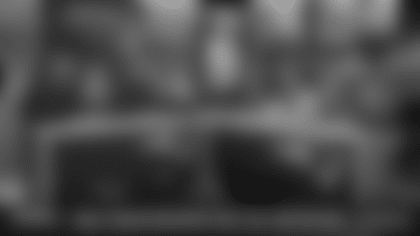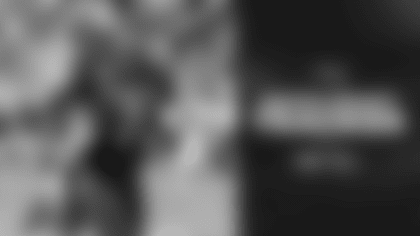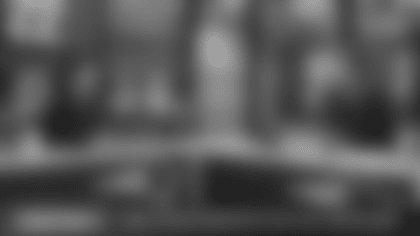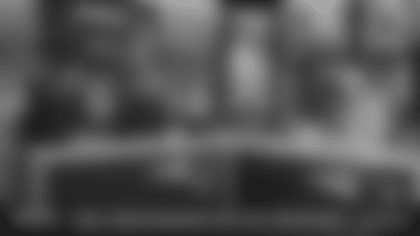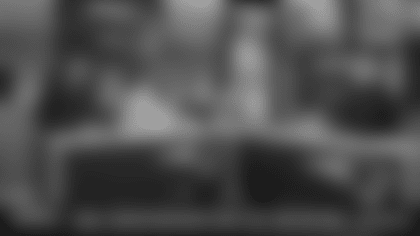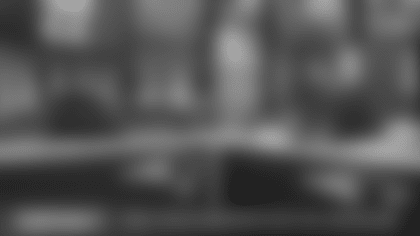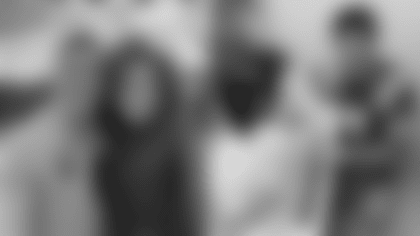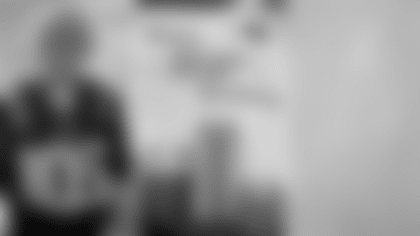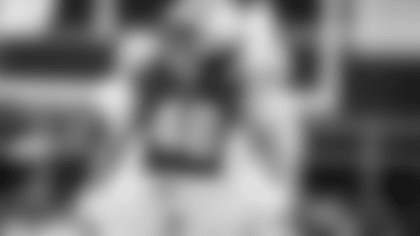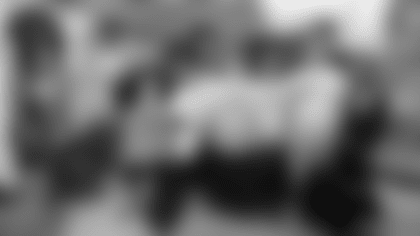For the last 17 seasons, Dwight Darian has patrolled the New England Patriots sidelines with a camera or two.
As the Director of Brand Identity and Design for Kraft Sports + Entertainment, his team is responsible for most things visual – from graphic design or the creative direction of a shoot to taking iconic photos from a handful of Super Bowls. In a way, he's helped capture a memory bank of sorts for the Patriots organization and its fan base. He didn't anticipate having to use those skills at home, but last October, Darian's successful and independent wife was diagnosed with Alzheimer's Disease at just 51 years old.
Darian hasn't really been ready to talk about it at work – at least, not to anyone who wasn't a close colleague, direct report, or his boss. But for the first time this year, the NFL extended its My Cause My Cleats initiative from players and coaches to team staff and personnel.
He initially jumped at the opportunity and signed up. That decision was followed by immediate regret. His wishful thinking was that he wouldn't be one of the Patriots employees chosen, but he was. That was the sign.
"It was time," Darian says. "It was time to talk about it."
During a Week 13 matchup with the Los Angeles Chargers at Gillette Stadium, 15 KSE employees represented a charity dear to them with customized Nike Air Force 1s.
The causes ranged in mission, with many, like Darian's, highly personal.
Digital marketing analyst Kristen Miquel was chosen to highlight Mass Eye and Ear – Harvard's teaching hospital dedicated to ophthalmology. Her little brother, Quentin, has been cared for there by Dr. Shizuo Makai since he was diagnosed with Juvenile Retinoschisis, a rare bilateral eye condition that causes vision loss, at three years old.
"Quentin actually became the first child to undergo surgery to repair macular holes in the eye," Miquel said. "Quentin's condition is far more common in older people, however, Dr. Mukai and his team successfully performed the surgery on Quentin. There is still no cure for his condition. Dr. Mukai and the whole Mass Eye and Ear team are incredible and always treat my brother and our family with respect and care."
After her brother suffered a sudden loss of vision in his right eye from a retinal tear, it took six surgeries to save his vision. It compelled her to run the Boston Marathon in 2021 to help raise money for the treatment and medical research that benefits families like hers.
"All six (surgeries) were at Mass Eye and Ear," Miquel said. "My brother and our family are directly impacted by the funds raised through the marathon and other similar efforts, as there is no current cure for his condition. Any and all research matters. Mass Eye and Ear doctors and researchers have played such an important role in Quentin's vision, so giving back is paramount. I ended up raising over $21,000."
Miquel is inspired by her brother every day. In part thanks to Mass Eye and Ear, he's a sophomore on the swim and dive team at the College of the Holy Cross in Worcester, Mass.
For similar reasons, KSE business development and external affairs specialist Lindsey Cunniff has been active in raising money for the American Liver Foundation.
"My dad's name was Christopher Cunniff," Cunniff said. "He was a hardworking plumber and builder, and one of the best and most selfless people I've ever met. He was the type of dad who supported his kids through all their endeavors growing up. He was truly my number-one fan and supporter."
She lost her father when she was 19. It was less than a year removed from his diagnosis of liver disease. Cunniff has run the Boston Marathon three times with the American Liver Foundation, raising over $50,000 to date.
"It's so special to be able to join this initiative as an employee," Cunniff said.
"I've seen players represent organizations that mean so much to them through My Cause My Cleats, and to have the opportunity to represent an organization as well is awesome. I'm always actively trying to spread awareness for liver disease and the American Liver Foundation and this is such a cool and unique way to do it."
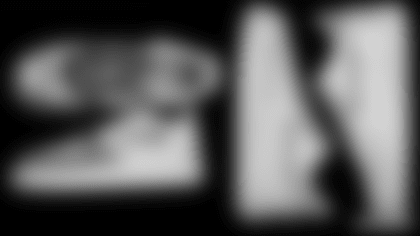
For Darian, though, this is all new territory.
He prefers his role behind the spotlight. This is his first time opening up in a way that can touch others going through similar situations – whether he knows them or not. Creative work has always been an outlet for him, and in designing his own custom Nikes, that has never rung more true.
"I designed them myself. I'm a control freak with that stuff," Darian said, explaining the symbolism behind the design he created.
"The first thing I said to her when she was having trouble remembering something was, 'I'm always going to remember for you.' She looked at me and said, 'I know.' That's the most important thing."
That promise, 'I will remember for you,' is painted under the outer left Swoosh on a deep purple base. The back of the shoe reads "Susan's fight is my fight."
Darian and his wife were friends before they were a couple.
They'd met during their former careers: he owned a creative services company, and TD Garden, her employer, was a client. He attended her wedding as a guest, and after their respective divorces, they reconnected.
"We met up for drinks and that was it," Darian said. "What was friendship became much more."
They bonded over a love of sports, especially hockey, and music. He became smitten with her intellect, watching in awe as she launched a fashion line as a side hustle on top of her full-time sales career. She took him to Europe for the first time, and through traveling with her, he was exposed to so much more.
"She opened the world for me," Darian said. "I was a homebody. I didn't want to go anywhere. She likes to have fun."
It's still a running joke that he forced her to marry him. He pushed it, adamant that if they were going to live together, her young daughter needed a father figure. If they were committed to each other, why not just make it official?
"I think it was somewhat of a test," Darian says in hindsight.
During the COVID-19 pandemic, he got to see how her brain worked up close. With both of them working from home, he would overhear her video calls with the doctors she dealt with in her role as a pharmaceutical sales executive. It blew him away.
"She was really good at it," Darian said. I knew she was smart, but she's also a really goofy person, too. That's when I realized how intelligent she is."
Unfortunately, that intellect made any indicators of the disease's onset nearly impossible to find.
After the pandemic, loved ones started to notice her scattered behavior. It started with a call from her boss, asking Darian if everything was alright. She typically spoke quickly. She was known for being sharp. Her brain was able to go from one thing to the next in a way that Darian jokes he could hardly keep up with.
Not long after that phone call, she was involved in an accident that totaled her car. She wasn't physically hurt, but didn't remember what had occurred to cause the crash. Their family noticed her trailing off in conversation. Her speech pattern began to change and she started to get depressed.
For eight months, she was treated medicinally for a mental health issue – which eventually was realized to be a misdiagnosis.
"Her psychiatrist is still with us today, she's become a friend, and one day she called me and said there's something wrong here," Darian said. "This isn't presenting like a mental health issue."
In October, while at home with his wife and mother-in-law, they received the results of her brain imaging via video call with their neurologist. The diagnosis was Alzheimer's. She was young and active with no family history.
It was a shock, to say the least.
"That's where we're all at, our family and friends, that this is the last thing we'd expect," Darian said. "There's no family history. When we finally met with the neurologist after the scan he said, look, there is severe damage here. He urged us to think about how far back it was that they noticed a changed pattern of behavior. That's the miraculous part about her – she was able to hide it until she couldn't."
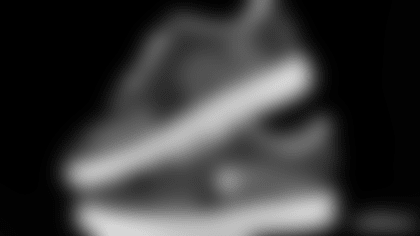
His wife can no longer work or drive, meaning this wildly successful and independent woman he fell in love with is now completely dependent on him.
They moved closer to her parents and siblings, who have been great support.
"I would be truly lost without the abundance of love and from her sister, brother, mom, and dad who have all played critical roles in not just love and care, but filling in every single gap, every day, that needs to be filled," Darian said. "I am blessed to have them and could not possibly navigate without their love. They are an incredible family."
Darian is his wife's primary caregiver. Lately, the routine is for him to drop her 13-year-old off at school every morning and pick up a coffee for his wife. She's always there waiting in the garage for him.
"It's the cutest thing," he says. "The key that every neurologist would tell you is that even though there's no cure, the best drug you can give her is to keep her busy and active. I've found the best drug for her is to keep her happy. If I can make her laugh, that's what I want to do."
Since the diagnosis, he's tried to do that as much as possible.
They went to a Luke Combs concert at Gillette Stadium together this summer, and it made her happy, despite the show ending early due to thunderstorms. She loves New York City, so he took her there for a weekend at the luxury Plaza Hotel on 5th Avenue.
Traveling together is not as easy as it once was. Darian laughs now, retelling the horror story of how he lost track of his wife for 40 minutes after getting out of the elevator to go to the Plaza's iconic Champagne Bar, realizing she wasn't right behind him after the door slid closed. Still, he's looking for any chance he can get to put her on a plane and show her something different.
Recently, that activity was a Boston Bruins game. She had been bugging him for a while to get back to TD Garden, and he again went all out.
"I went online and I way overpaid for Bruins tickets to get the best seats I could find," Darian said.
"I told her, and just to see her smile was worth it. I'm not going to tell you how much I paid for our seats but it was worth it. Those are the types of things I want to be doing more. Even if we're going to the game to stay half a period, it's worth it to see her get ready to go and see her excitement to be there."
Being a primary caretaker in this situation is not easy, especially with a career in professional sports. Darian would never let you feel sorry for him, though, because he doesn't feel sorry for himself. Still, some days are admittedly terrible.
"(Longtime Patriots photographer) David Silverman is one of the first people I told, because he was like, 'What the (expletive) is wrong with you?' This was last year and I don't know how to answer that yet," Darian said.
"If I don't keep moving and I give my brain time to think I'm done. Everything I do is for her. She loves that I do all the work, she laughs and thinks it's great. But it's the best job I'll ever have."
Darian is doing his best to become more patient, a crucial attribute he says he's much better with now. Opening up helps, but doesn't take away the way he feels watching his wife shut down in those moments where reality sets in for her.
"She's tough as (expletive), man," Darian says. "But when that happens, that's when it's tough. I can handle everything else, but it's so cruel."
He knows God chose Darian to be his wife's rock during this time. To him, it's simple, and he can't imagine a world where he doesn't take on that responsibility for her.
But with that, he knows there are people around the world in his position, serving as a caretaker for a person they love more than anything. With everything that's changed, hope is the constant in their daily lives.
Through the NFL and My Cause My Cleats, God has also given him, and Miquel and Cunniff and their colleagues, this platform to share their stories.
He's finally telling his, even if it only helps one person.
"I chose the Alzheimer's Association wasn't only to help them come up with the next drug or something, or for what they do for those who have the disease," Darian said.
"It's also because of what they do for those who are trying to care for the people who have the disease. Support. That's all you can do now. This is acknowledging how difficult it is, for anybody who is going through it."
Learn more about the organizations Patriots players and Kraft Sports + Entertainment employees are supporting for My Cause My Cleats here.


